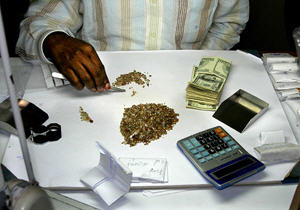
The minerals include cassiterite, or tin ore, as well as coltan, used in devices such as mobile phones.
The return of the materials follows new international regulations aimed at cleaning up the mineral sector.
DR Congo's mineral wealth has been a major factor in years of conflict.
Armed groups - local and foreign - have seized control of many mines in the east, bordering Rwanda and few Congolese have benefited from their country's vast mineral wealth.
Rwanda has twice invaded DR Congo saying it was fighting rebel groups based there but its army has been accused of looting minerals during the conflict in which an estimated five million people died.
Rwanda's Natural Resources Minister Stanislas Kamanzi handed the minerals - loaded in five lorries - to Congolese authorities at a ceremony in the border town of Gisenye.
BBC East Africa correspondent Will Ross says the handover is a sign of the greatly improved relations between two countries that have often been bitter enemies.
'Conflict-free'
"I think it [reflects] the spirit of cooperation between the two countries," DR Congo mining ministry adviser, Paul Mabolia Yenga, told the BBC's Network Africa programme.
Rwanda's deputy director of natural resources Michael Biryabarema said Kigali wanted to end perceptions that it benefited from illegal mining in DR Congo.
"It's a lie that has gone for a long time," he said.
He said Rwanda and DR Congo would work together to strengthen their mining sectors.
"We are more interested in... the development of our industry, bilateral relations and the establishment of proper trade relations," Mr Biryabarema said.
Rwanda has for years been a major conduit for conflict minerals from DR Congo, correspondents say.
It long denied any involvement but now supports efforts to make the trade more transparent.
Any seized minerals without the sign would be returned, Mr Biryabarema said.
"I think we've set a precedent... but preferably they will not be allowed into the country if they have not been tagged," Mr Biryabarema said.
The landlocked country has mineral deposits within its own borders and wants to label them conflict-free, our correspondent says.
But as Rwanda stands to lose out on vast revenues from the trade in Congo some analysts question just how rigorous the authorities there will be.
Earlier this week, a website was launched to promote transparency in the Congolese mining sector.
The Carter Center said www.congomines.org would give people more information about the mining sector, including contracts and payments.
Hundreds of mining documents and maps will be published on the site, it said.
But Congolese state-owned mining giant Gecamines would not release confidential contracts without the permission of its joint venture partners, CEO Kalej Nkand said, Reuters news agency reports.
"The proposed publication of these contracts has no legal basis. It is doubtful that our partners would consent to it," he is quoted as saying.
Related articles
- • DRC and Rwanda Sign Declaration of Principles for Peace in Eastern Congo (April 25, 2025)
- • European Union Sanctions Rwanda and M23 Officials over Congo Conflict (March 17, 2025)
- • Canada and Germany Impose Sanctions on Rwanda for Supporting M23 Rebels (March 4, 2025)
- • UK Suspends Financial Aid to Rwanda Over M23 Rebellion (February 25, 2025)
- • European Union Suspends Defence Consultations with Rwanda (February 24, 2025)
- • Tshisekedi Announces Government of National Unity and Calls for Unity Against M23 Rebels (February 23, 2025)
- • UN Security Council Calls on Rwanda to Stop Supporting M23 Rebels in DR Congo (February 22, 2025)
- • US Sanctions Rwanda's Minister James Kabarebe for Central Role in DR Congo Conflict (February 20, 2025)
- • Rwanda-Backed M23 Rebels Summarily Executed Children in Bukavu, UN Reports (February 19, 2025)
- • DR Congo Citizens Head to Polls to Elect President, Members of Parliament (December 20, 2023)
- • Ebola outbreak declared an international Public Health Emergency (July 17, 2019)
- • Jean-Pierre Bemba Returns to DR Congo (August 1, 2018)
- • At least 30 dead after massacres in Ituri (March 2, 2018)
- • Botswana Urges Joseph Kabila to Step Down (February 26, 2018)
- • No elections in DR Congo in December without electronic voting machines: INEC (February 13, 2018)
- • DR Congo reach final of African Nations Championship (February 3, 2016)
- • Peacekeepers, Congo Army to Resume Joint Fight Against Rwandan Rebels (January 28, 2016)
- • DR Congo Scores High on Growth, Lags in Poverty Reduction: IMF (October 13, 2015)
- • Political tensions 'running high' in DR Congo ahead of 2016 elections (October 7, 2015)
- • DRC Army Putting Pressure on FDLR (April 1, 2015)
- • Police Open Fire on Crowd Protesting Election Law Change (January 19, 2015)
- • Congo Improves Natural Resources Accounting (July 4, 2014)
- • 15 dead in football match stampede in Kinshasa (May 12, 2014)
- • Kerry Calls on Kabila to Honor Constitution (May 4, 2014)
- • Security Council extends UN mission, intervention force in DR Congo for one year (March 28, 2014)
- • Death toll in Lake Albert boat accident rises to 108 people (March 24, 2014)
- • Bosco Ntaganda Attacked Civilians on Ethnic Grounds, ICC Prosecutor Says (February 10, 2014)
- • No 'Peace Deal' With Defeated M23 Rebels, DR Congo Says (November 11, 2013)
- • Congo Will Not Sign a 'Peace Deal' With Defeated M23 Rebels, Government Says (November 6, 2013)
- • Congo Army Takes Control of Mbuzi Hill From M23 Rebels (November 4, 2013)
Tags: |







